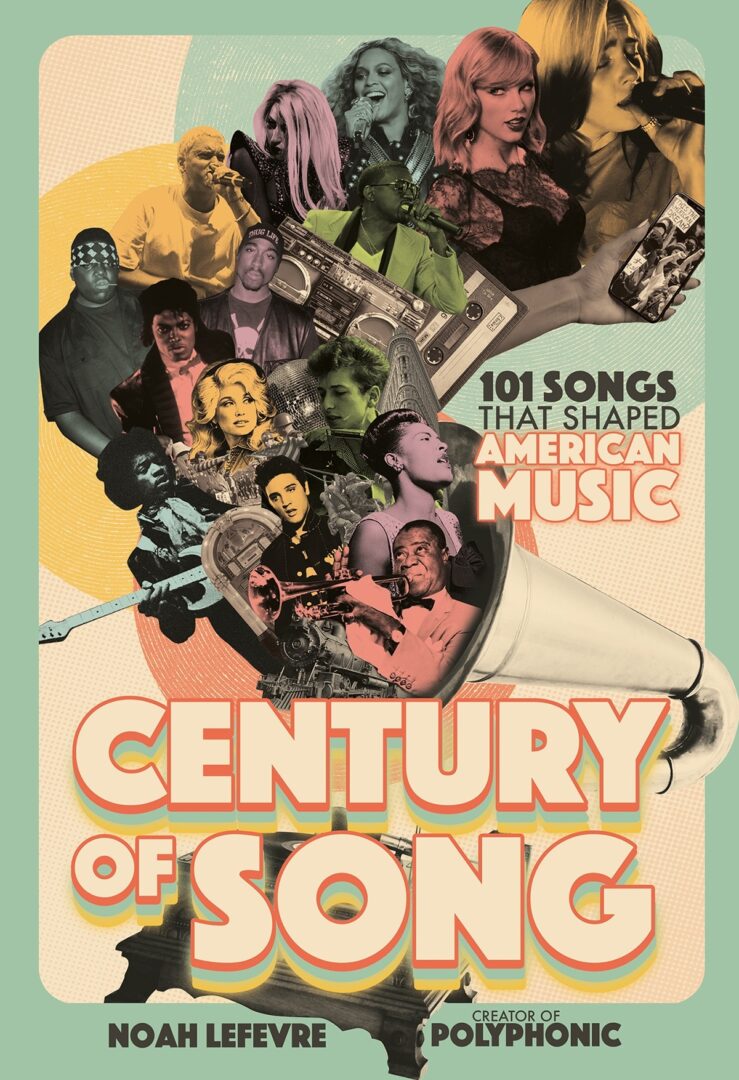“101 Songs that Shaped American Music”

There’s an old line which goes something like, “Writing about music is like dancing about architecture.” It’s hard, incredibly hard, to convey one’s thoughts and information about one medium in a whole other, wildly different medium. Just ask any of those YouTubers trying to get their takes about film and song across, I imagine they’d agree.
Among that list is Noah Lefevre, creator of the channel Polyphonic. His two deep and abiding loves that come through in his videos are that of music and of visual design. So the fact that he wrote a book about music and it features his almost dada-esque art style isn’t as surprising as one might think. I pre-ordered it during the run-up to release day and since it arrived on my tablet I’ve been taking in a few chapters at a go every few days. I’m not actually done with it yet but it’s not like there’s a surprise twist waiting for me at the end.
Probably.
Century of Song (that’s a Kobo link, feel free to hit up a different retailer if you like) is structured fairly simply: Each decade (or portion thereof, at the bookends) gets an introduction. Then for each year within that decade there’s a song. Lefevre keeps each entry short and sweet, a few pages and a photograph. Each song’s story is self-contained. Any sense of narrative flow comes from the sense of history swirling around and carrying pop music along the great river of time, rather than from the author imposing any particular grand unified theory. He doesn’t shy away from the rough truths at the heart of popular music over the past century such as the deeply-ingrained racism and sexism at play, but he doesn’t belabor such points either. The lessons are there but the teacher isn’t getting bogged down talking about them.
The river flows ever onward.
This is, to be clear, a history centered mainly on the musical culture of the US of A, hence the subtitle. The popular culture, for the most part, is centered. For each year a song is selected that nudged music forward (or sideways in an interesting way) that stands out in some way. Also, Lefevre set himself the restriction of not using the same artist twice, so we don’t end up with things like most of the 1960s being one Beatles song after another. I imagine this restriction was easier to hold to than one might think because goodness, what a rich tapestry our musical heritage really is!
Lefevre covers wide genre ground and, through his choices, shows how everything is in conversation with everything else. Jazz, rock, soul, country, hip-hop, nothing exists in a vacuum, and it’s great to get this kind of bird’s eye view of the whole tapestry.
So why haven’t I finished reading the whole book already? Because there’s really only so long I can read one short story/essay after another before my brain requires me to change modes. This is a “my brain” thing rather than a failing of the author, to be clear. Each song’s chapter is well-assembled and fun to read.
At some point I’ll probably pick up a hardcopy (if I can) of the book because I suspect that a lot of the design aesthetic is lost in the eBook format. The pull quotes for each song (most but not all songs have them) kind of show up at random as bold sections in the text, and the artwork along the way just kind of gets plopped in at random (again, due to the vagaries of ‘epub’). This isn’t the author’s fault, and it’s not distracting enough to ruin the enjoyment of the material. Just, be aware of it if you’re wondering whether to buy the dead-tree or just-electrons version.
Overall, though, I’m delighted by the book. (I’m still in the mid-00s, so nearing the end at least.) A lot of the bits that I lived through I learned more about, and the before-my-time stuff was a lot of all new information. I can heartily recommend Century of Song to fans of popular music in the USA, regardless of your preferred genre.
